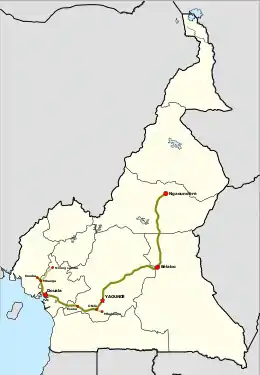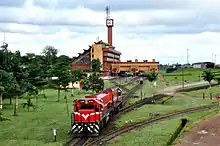Rail transport in Cameroon
Rail transport in Cameroon is primarily operated by Camrail,[1] a subsidiary of Comazar.
| Railways in Cameroon | ||||||||||||||||||||||||||||||||||||||||||||||||||||||
|---|---|---|---|---|---|---|---|---|---|---|---|---|---|---|---|---|---|---|---|---|---|---|---|---|---|---|---|---|---|---|---|---|---|---|---|---|---|---|---|---|---|---|---|---|---|---|---|---|---|---|---|---|---|---|
| ||||||||||||||||||||||||||||||||||||||||||||||||||||||


History

Infrastructure
Separate from the metre gauge mainlines were narrow gauge plantation railways, especially in the Tiko area. These served cocoa and sugar plantations.[2][3]
Possible extensions
There are plans for an iron ore railway, which however might be isolated from existing railways. The distance from the mine to the nearest likely port is about 500 km. A connection to the nearest Camrail line at Mbalmayo on the Nyong River would be 350 km long. Because of the heavy tonnages to be carried, this railway is likely to be 1,435 mm (4 ft 8 1⁄2 in) (standard gauge). The railway would run from mines near Mbalam to a port near Lolabe.[4] The expected traffic is 35 million tonnes per year for 25 years.[5]
Extensions of the rail network to Maroua and Yokadouma to promote the forestry industry have also been recommended.[6]
In December 2010, it was reported that a South Korean consortium planned to build new railways in Cameroon.[7]
Adjacent countries
There are no links yet to railways in adjoining countries. The nearest the Nigerian railway system (3 ft 6 in (1,067 mm)) approaches Cameroon is Maiduguri over 100 km from the northern Cameroon border. The Gabon rail system (1,435 mm 4ft 8.5in) and Congolese rail systems 3 ft 6 in (1,067 mm) gauge do not run near to the Cameroonian border.
In 2011 funding for construction of a standard gauge railway line in Chad was obtained; the construction would include a line to Moundou and Koutéré near the Cameroon border, as well as a link to Nyala on the border with Sudan.[8]
Rolling stock
| Type | Built | Manufacturer | # | ? | № | 2nd? | Notes |
|---|---|---|---|---|---|---|---|
| BB 1000 | 1978 | Moyse | ? | ? | Only one (BB 1039) left in service in 2012 in Douala[9] | ||
| BB 1100 | 1981 | Alstom | 20 | 1101–1120 | [9] | ||
| BB 1200 | 1968 | Alstom | 20 | 1201–1213 | 3 remained in 2012[9] | ||
| CC 2200 | 1980 | MLW/Bombardier | 30 | 2201–2230 | [9] | ||
| CC 2600 | 1975 | GM-EMD | 6 | 2601–2606 | Series 34-800 obtained from Spoornet, South Africa[9] | ||
| CC 3301 | 2009 | NREC | 2 | 3301–3302 | Freight locomotives[9] | ||
| CC 35.2 | 1974 | GM-EMD | 6 | ? | Series 35-200 leased 2000–2003 from Spoornet, South Africa[9] | ||
| ZE 500 | 1976 | Alstom | 5 | 501–505 | Former series 9600 obtained from CP (Portugal) in 2005[9] |
Standards
- Brakes: Westinghouse Air[10]
- Couplings: SA3
See also
References
- Charlier, Florence; N'cho-Oguie, Charles (2009). Sustaining reforms for inclusive growth in Cameroon: a development policy review. World Bank Publications. p. 154. ISBN 978-0-8213-7403-0. Retrieved 15 July 2010.
- http://www.gouverneur-ebermaier.de/english/historie.htm%5B%5D
- Beddington, Claude (1 January 1938). "We Sailed from Brixham". P. Davies – via Google Books.
- "Railway Gazette: Mbalam ore railway scoping study agreed". 11 December 2010. Retrieved 11 December 2010.
- Swanepoel, Esmarie. "Sundance signs rail deal with Chinese firm for Mbalam project".
- George Mbella (23 September 2010), "Wood Industry - Request for Railway in Yokadouma and Maroua", allafrica.com
- "South Korean Plan for Cameroon". Railways Africa. 12 December 2010. Retrieved 12 December 2010.
- "Work to begin on Chad rail network", railwaygazette.com, Railway Gazette International, 13 January 2012
- "Camrail, Cameroon, 2012".
- "Cameroon: Supply of Locomotive Parts. Iran: Invitation to Tender for Rail Lines. Turkey: Supply of Electric Locomotive".
External links
![]() Media related to Rail transport in Cameroon at Wikimedia Commons
Media related to Rail transport in Cameroon at Wikimedia Commons